
 Flash News
Flash News
The US is involved in the war, why did Trump take the risk of attacking Iran?
Bosnian tourist drowns in Durres
Massive accident on the Librazhd-Qukas axis, 3 injured, one in critical condition
An apartment in Yzberisht is engulfed in flames
Robbed a jeweler in Gjirokastra in 2021, 45-year-old extradited from Greece (NAME)
The US is involved in the war, why did Trump take the risk of attacking Iran?
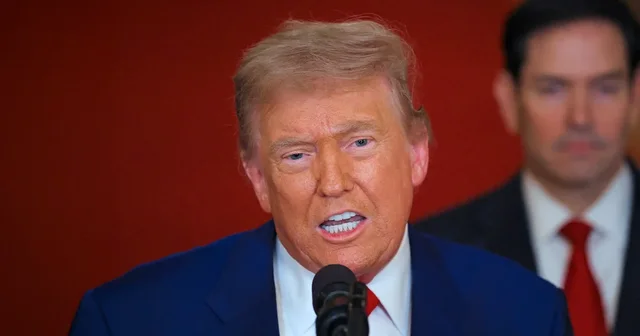
From sanctions to sabotage and cyberattacks to diplomacy, the United States has used every weapon it can for 20 years to slow Iran's long march toward nuclear weapons. On Sunday morning, President Donald Trump turned to the ultimate weapon, the brute military force that his four predecessors had deliberately avoided, fearing it would plunge the United States into war in the Middle East.
For Trump, the decision to attack an enemy country's nuclear infrastructure represents the biggest and perhaps most dangerous risk of his second term, the New York Times said in an analysis. The US president is betting that the United States can repel any retaliation ordered by the Iranian leadership against the more than 40,000 US soldiers spread across bases across the region.
All are within range of Tehran's missile arsenal, even after eight days of relentless Israeli attacks. He is also betting that he can prevent a much-weakened Iran from using its familiar techniques of terrorism, hostage-taking and cyberattacks as a more indirect form of attack to retaliate.
More importantly, the US newspaper's analysis continues, he is betting that he has destroyed Iran's chances of rebuilding its nuclear program in the future. This is an ambitious goal, as Iran has made it clear that, if attacked, it will withdraw from the Nuclear Non-Proliferation Treaty and move its extensive program into secrecy.
That’s why Trump paid so much attention to the destruction of Fordow, where Iran produced almost all of the war-grade fuel that most concerned the United States and its allies. The president’s aides may have talked about the complexity of the operation, but they stressed, even to their European partners, that this is not a declaration of war.
The White House is talking about preventive action aimed at neutralizing a threat, not the Iranian regime, but the Iranians will not perceive it in the same way. In fact, they are talking about the Middle Eastern bully who must now accept peace, otherwise there will be a tragedy in Iran far greater than what we have seen in the last eight days.
Essentially, Trump was threatening to expand his military cooperation with Israel. Initially, the United States distanced itself from the operation, but Trump quickly changed course and referred to the United States' ability to assassinate Iran's 86-year-old supreme leader, Ayatollah Ali Khamenei, whenever it wanted.
The time is favorable.
After October 7, 2023, Iran was suddenly deprived of its “proxies,” Hamas and Hezbollah, its closest ally, Bashar al-Assad of Syria, was forced out of the country, and Russia and China, which had formed an alliance of interests with Iran, did not appear after the Israeli attack. Thus, the New York Times continues, the nuclear program remained Iran’s only defense, the ultimate means of defense for the heirs of the Iranian Revolution that began in 1979.
Future historians will likely wonder whether the United States, its allies, or the Iranians themselves could have acted differently—and whether Trump’s threat succeeded. If Iran fails to respond, if the ayatollah’s authority weakens, or if the country abandons its earlier nuclear ambitions, Trump will no doubt claim that he alone was willing to use American military power to achieve a goal that his four predecessors considered too dangerous.
But there is another possibility. Iran could recover slowly, its surviving nuclear scientists could take their knowledge into secrecy, and the country could follow the path opened by North Korea in a race to build a nuclear bomb. Iran might conclude that this is the only way to keep major hostile powers at bay and prevent the United States and Israel from carrying out an operation like the one at dawn Sunday./ New York Times
Latest news

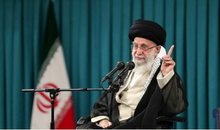
US airstrikes/ Iran warns: The game is not over!
2025-06-22 21:29:22

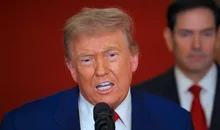
The US is involved in the war, why did Trump take the risk of attacking Iran?
2025-06-22 20:28:22
Israel-Iran conflict increases global tensions: Is the Albanian economy at risk?
2025-06-22 20:02:04
The US bombed Iran/ Rama: I support Trump's sincere efforts!
2025-06-22 19:40:21
Bosnian tourist drowns in Durres
2025-06-22 19:05:48

The 10 strongest criticisms of the PACE report on the May 11 elections!
2025-06-22 18:41:21


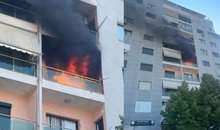
An apartment in Yzberisht is engulfed in flames
2025-06-22 17:32:13


Rinderpest/ The number of outbreaks rises to 10, here are the affected districts
2025-06-22 16:25:12

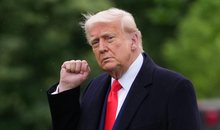
"Trump has opened Pandora's box"
2025-06-22 15:10:04

Pope Leo XIV: Stop the tragedy of war before it becomes an irreparable abyss
2025-06-22 14:24:22
Criminal group busted in Belgium, 10 Albanians among those arrested
2025-06-22 14:00:58
Cities race for tourists, Tirana cheapest, but busiest
2025-06-22 13:35:53
Kurti supports US strike: International security needs fewer nuclear weapons
2025-06-22 13:18:54
Selling drugs in the former Bllok, 23-year-old arrested
2025-06-22 12:57:58
Berisha supports US strike on Iran: Strong call for overthrow of dictatorship
2025-06-22 12:39:35
Starmer supports US attack on Iran, calls on Tehran to return to negotiations
2025-06-22 12:20:56
Sentenced to 8 years in prison in Italy, 33-year-old Albanian arrested
2025-06-22 11:54:45
Iran condemns US attack on nuclear facilities, warns of consequences
2025-06-22 11:34:21
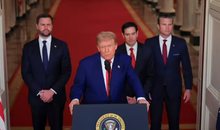

Albanian Railways is affected by collective staff cuts
2025-06-22 10:46:46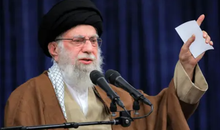
The US has changed the course of the conflict - how will Iran respond?
2025-06-22 10:24:26
Cannabis in drainage canals, 48-year-old arrested in Fier
2025-06-22 10:06:41
Albanians 'invade' New York, thousands march in the Red and Black parade
2025-06-22 09:44:26
Foreign exchange, the rate at which foreign currencies are sold and bought
2025-06-22 09:27:27
Is it worth buying an apartment to rent out?
2025-06-22 09:12:40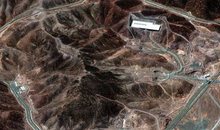
US bombs Iran, hits three Tehran nuclear sites
2025-06-22 08:53:08
Horoscope, what do the stars have in store for you today?
2025-06-22 08:35:50
Weather forecast/ How temperatures will change during the day
2025-06-22 08:20:43
Morning Post/ In 2 lines: What mattered yesterday in Albania
2025-06-22 08:00:29
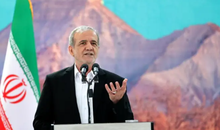
Iranian President: We will not stop nuclear program
2025-06-21 21:46:32
Europe hit by first heat wave: Up to 40°C expected this weekend
2025-06-21 21:19:19
Borussia Dortmund claim first win in Club World Cup
2025-06-21 20:56:04

Accident on the Puka-Shkodra axis, two injured
2025-06-21 20:05:04

ChatGPT can damage your brain, here's what the study says
2025-06-21 19:20:25


Belarus opposition leader released after five years in prison
2025-06-21 18:22:57
Renowned journalist and teacher in Korça, Vehbi Furxhi, passes away
2025-06-21 18:06:16
Accident in Fier-Levan, two injured
2025-06-21 17:43:25
Tourism in traffic, when roads undo success
2025-06-21 17:25:31

Broja on the verge of leaving Chelsea, 4 teams in talks for midfielder
2025-06-21 16:42:02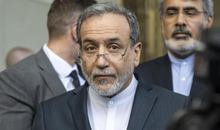
Iran confirms death of tenth nuclear scientist
2025-06-21 16:24:28

The Balkans as a warehouse for migrants?
2025-06-21 15:49:53
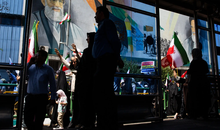
Khamenei names potential successors if he is killed
2025-06-21 15:10:58


Memli Krasniqi re-elected as PDK chairman
2025-06-21 14:29:12



Israel says it has eliminated another top Iranian commander
2025-06-21 12:43:26

Iran and Israel exchange new attacks, Tehran rejects talks with the US
2025-06-21 12:00:20

The impasse continues, the constitution of the Assembly fails for the 35th time
2025-06-21 11:14:23

Report: Cadastre ignores Parliament and ALSAI recommendations
2025-06-21 10:35:59
Car loses control on Tepelena-Kelcyrë road, driver injured
2025-06-21 10:14:47

It failed 34 times, today a new attempt to constitute the Kosovo Assembly
2025-06-21 09:37:02
Foreign exchange, June 21, 2025
2025-06-21 09:17:10


With temperatures up to 35 degrees, check out today's weather forecast
2025-06-21 08:15:54
Morning Post/ In 2 lines: What mattered yesterday in Albania
2025-06-21 07:58:20


Dance with the mask of evil
2025-06-20 21:11:50
Matura 2025, Albanian Language and Literature exam grades published
2025-06-20 20:40:37
Tabaku: Albania has African wages and European prices
2025-06-20 20:33:02


UK temporarily withdraws embassy staff from Iran
2025-06-20 19:16:02
How Albania became the country with the highest cost of living
2025-06-20 18:49:11


Hail and strong storm "grab" Belshi
2025-06-20 17:35:56

School closures increase parents' financial burden during the summer
2025-06-20 16:49:19
KAS dismisses SP over vote revaluation
2025-06-20 16:34:02
